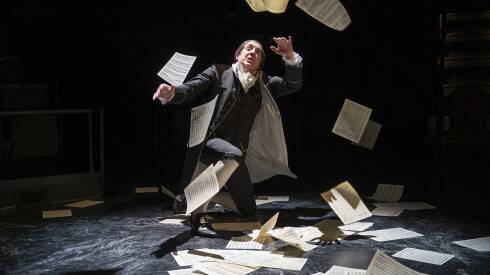Peter Shaffer’s “Amadeus” could be titled “Salieri” as focused as it is on the rivalry between Wolfgang Amadeus Mozart — an all-powerful sun —and the composer Antonio Salieri, by comparison a flickering matchflame.
In the court of Emperor Joseph in late 18th century Vienna, Salieri is forced to face his own mediocrity in the face of Mozart’s brilliance. An endlessly fascinating, often sympathetic villain, Salieri’s quarrel isn’t with Mozart; railing at the heavens, he’s in conflict with God. Mozart is merely the battlefield.
That battlefield has an epic, intimate sweep in Shaffer’s 1979 drama (adapted into the 1984 Oscar-winning movie of the same name) now extended through Jan. 25 at Steppenwolf Theatre. Directed by Robert Falls, “Amadeus” is a psychological thriller punctuated by the tantalizing passages from Mozart’s greatest hits.
Falls has a faultless ensemble, led by Ian Barford’s Salieri and David Darrow’s Mozart. The dialogue is often in the howling key of Sturm und Drang, especially when Salieri rails against a God who gave all-but-unimaginable talent to an “obscene boy” prone to fart jokes.
The bombast feels almost wholly truthful and only sometimes excessive. In lesser hands, the tooth-gnashing emoting could make for a leave-at-intermission situation. Under Falls’ direction, the ensemble makes it work. This is, after all, a tale of massive ego, once-in-a-century genius and lethal jealousy played out by men in elaborate wigs, rouge and copious ornamental ruffles.
A more vexing issue is that “Amadeus” provides only tantalizing snippets of Mozart’s music, putting the audience in the thrall of his compositions, only to cut them short. There’s no way to fix this short of rehauling “Amadaus” into a full-on jukebox musical, which would be a horrendous idea. Even truncated, Mozart’s brilliance is evident.
Shaffer frames the story with Salieri’s deathbed, opening in 1825 before flashing back decades as the composer strikes a bargain with God: In exchange for fame, talent and fortune, Salieri will use his music as a “conduit” to the heavens. For a while, it seems the bargain has been made. Salieri gets a prominent position at the Austrian Court of Emperor Joseph II (Gregory Linington). His star is on the rise.
But in 1792, Mozart arrives at Court, a crude, giggly man-child who tumbles about with women in the grand hallways of the Holy Roman Emperor’s palace. Moreover, Mozart’s operas shock the court: Instead of writing about myths and legends, Mozart centers his operas on barbers, servants and corrupt noblemen. Salieri, seeing Mozart’s genius as a betrayal by God, devotes his life to destroying the young upstart.
Shaffer’s rendering of Salieri and Mozart’s relationship is fictional, but that doesn’t make it any less hair-raising. The downfall of both men is a sobering reminder that poverty and delusional monomania can be equally ruinous.
Barford makes Salieri relatable, even at his most deplorable. As one of the few actors around who can chew the scenery to sawdust and still render truthful emotion, he makes Salieri’s endless scheming and mega-angst understandable. Nobody wants to admit to being a hack. Yet in Mozart’s blinding light, that’s exactly what Salieri must concede. It annihilates him.
Darrow’s Mozart is a punk rocker to a court of crusty establishmentarians. Whether rolling around in the skirts of his beloved Constanze (a beguiling Jaye Ladymore) or conducting the ethereal strains of “The Magic Flute,” he captures Mozart’s mercurial, out-sized emotions, child-like trust and supreme self-confidence.
As Joseph II, Linington makes the Emperor’s signature reactions (“Fits and fireworks!” “There it is”) with a comic aplomb. Ditto John Lister as Count Franz Orsini-Rosenberg, whose iconic “too many notes” critique the Emperor adopts as his own.
Set designer Todd Rosenthal creates a minimalist world defined by massive chandeliers twinkling below broken windowpanes — a visual reminder of the courtly opulence and the grim poverty that defined Mozart’s life. Amanda Gladu’s period costumes are rich in character-building detail: At court, Mozart dresses with the garish panache of a peacock crossed with a unicorn. Joseph, in creams and sparkles, dons what passes for 1790s stealth wealth.
Connor Wang’s sound design is sumptuous, from the lone, piercing oboe that of “Piano Concerto No. 10” to the crystalline, otherworldly reach of “Kyrie” from the Mass in C Minor.
“Amadeus” doesn’t completely earn its nearly three-hour run time — it could lose 10 minutes without compromising character or plot. It’s a rich, robust, darkly compelling drama regardless. If you’ve ever railed against the unfairness of the world or gasped in the presence of greatness, you’ll see yourself in Salieri and be left in awe by Wolfgang Amadeus Mozart.
